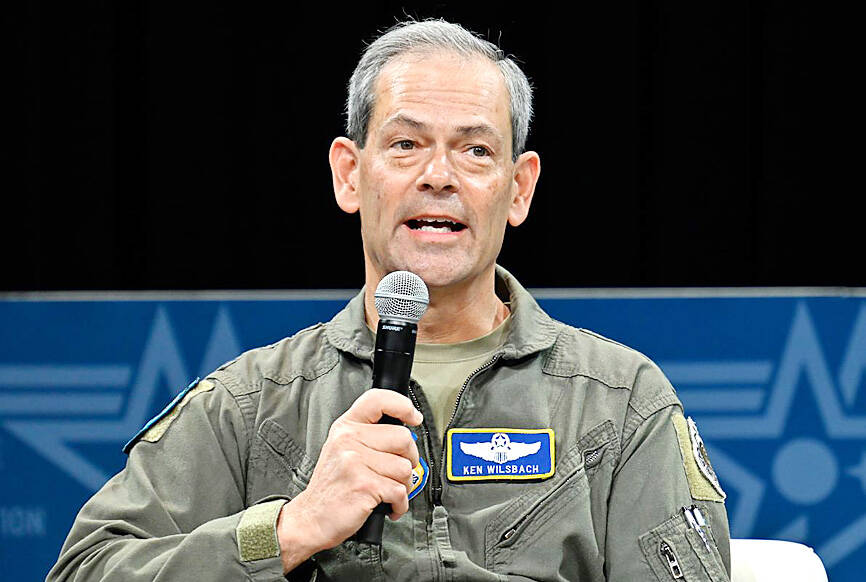If war broke out over the Taiwan Strait, the primary task of the US military would be to sink Chinese ships to prevent a Chinese blockade, US Pacific Air Forces (PACAF) Commander Kenneth Wilsbach said on Wednesday.
Speaking to reporters at the Air and Space Forces Association Warfare Symposium in Aurora, Colorado, Wilsbach said he arrived at this conclusion following Beijing’s reaction to the visit of then-US House of Representatives speaker Nancy Pelosi’s visit to Taiwan in August last year.
“You saw when speaker Pelosi went to Taiwan, what [China] did with their ships,” the US Air Force general said. “They put them on the east side of Taiwan — the side opposite China — as a sort of blockade.”

Photo: Screen grab from Pacific Air Forces’ Twitter Page
The surface-to-air missiles onboard the Chinese ships will create an anti-access/area denial zone for the People’s Liberation Army, Wilsbach said.
This zone will deter enemies due to the risk of being shot down, Wilsbach said.
While the US government prioritizes deterrence, in the event that war breaks out, “we’ve got to sink the ships,” he said.
“Sinking ships is a main objective of not only PACAF, but really anyone that’s going to be involved in a conflict like this,” he added.
The US and its international military partners have stepped up planning and training in preparation for potential conflict, Wilsbach said, adding that his crew frequently practiced the US Air Force’s strategy of dispersing crew and aircraft across many islands.

The Coast Guard Administration (CGA) yesterday said it had deployed patrol vessels to expel a China Coast Guard ship and a Chinese fishing boat near Pratas Island (Dongsha Island, 東沙群島) in the South China Sea. The China Coast Guard vessel was 28 nautical miles (52km) northeast of Pratas at 6:15am on Thursday, approaching the island’s restricted waters, which extend 24 nautical miles from its shoreline, the CGA’s Dongsha-Nansha Branch said in a statement. The Tainan, a 2,000-tonne cutter, was deployed by the CGA to shadow the Chinese ship, which left the area at 2:39pm on Friday, the statement said. At 6:31pm on Friday,

The Chinese People’s Liberation Army Navy’s (PLAN) third aircraft carrier, the Fujian, would pose a steep challenge to Taiwan’s ability to defend itself against a full-scale invasion, a defense expert said yesterday. Institute of National Defense and Security Research analyst Chieh Chung (揭仲) made the comment hours after the PLAN confirmed the carrier recently passed through the Taiwan Strait to conduct “scientific research tests and training missions” in the South China Sea. China has two carriers in operation — the Liaoning and the Shandong — with the Fujian undergoing sea trials. Although the PLAN needs time to train the Fujian’s air wing and

STRIKE: Some travel agencies in Taiwan said that they were aware of the situation in South Korea, and that group tours to the country were proceeding as planned A planned strike by airport personnel in South Korea has not affected group tours to the country from Taiwan, travel agencies said yesterday. They added that they were closely monitoring the situation. Personnel at 15 airports, including Seoul’s Incheon and Gimpo airports, are to go on strike. They announced at a news conference on Tuesday that the strike would begin on Friday next week and continue until the Mid-Autumn Festival next month. Some travel agencies in Taiwan, including Cola Tour, Lion Travel, SET Tour and ezTravel, said that they were aware of the situation in South Korea, and that group

Taiwanese celebrities Hank Chen (陳漢典) and Lulu Huang (黃路梓茵) announced yesterday that they are planning to marry. Huang announced and posted photos of their engagement to her social media pages yesterday morning, joking that the pair were not just doing marketing for a new show, but “really getting married.” “We’ve decided to spend all of our future happy and hilarious moments together,” she wrote. The announcement, which was later confirmed by the talent agency they share, appeared to come as a surprise even to those around them, with veteran TV host Jacky Wu (吳宗憲) saying he was “totally taken aback” by the news. Huang,